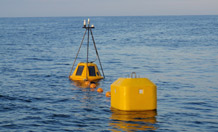
One of four surface-following wavebuoys owned and managed by the University of Exeter, which will soon be deployed at FaBTest.
Falmouth set to host wave energy test site
Falmouth Harbour Commissioners (FHC) and The Crown Estate have signed a lease to create FabTest, a new wave energy ‘nursery’ test site in Falmouth Bay on the south coast of Cornwall.
The site has also been issued with a marine license by the Marine Management Organisation (MMO), which allows the mooring of marine energy converter devices.
The announcement, made at the Regen SW Renewable Futures conference in Bath, is the latest step in the creation of a marine energy park in South West England.
The Park aims to pull together commercial and academic organisations and marine energy assets to create a vibrant and dynamic centre of marine energy in the region.
FabTest, which is not grid-connected, will enable wave energy generation device developers to conduct sea trials of their devices in moderate seas, close to port facilities. It is a stepping stone to the deployment of arrays of devices at Wave Hub, the world’s largest grid-connected wave energy demonstration facility installed 10 nautical miles off the north coast of Cornwall last year.
The management of the site will be undertaken by a partnership between FHC and the University of Exeter. The FabTest project has been driven by a steering group which has also included Wave Hub and the marine energy support industry including A&P Group and Mojo Maritime in Cornwall.
Mark Sansom, Chief Executive of Falmouth Harbour Commissioners, said: “FabTest offers a pre-consented area in Falmouth Bay licensed to test up to three devices at a time and we are delighted to have signed this lease with The Crown Estate. We will manage the facility and have already secured a licence from the MMO. This means we can offer developers a streamlined approval process for individual devices in an area with a range of depth and seabed types that does not interfere with marine traffic.”
Rob Hastings, Director of the Marine Estate, The Crown Estate said: “We are delighted to have leased this site for the FabTest project and look forward to seeing it being used to test devices. As the emerging wave industry makes the transition from technology R&D to commercial project development, further technology testing is essential and FabTest offers to play an important supporting role. The Crown Estate is also pleased to be working with RegenSW and other stakeholders in the southwest of England to start planning for commercial-scale wave and tidal project development in the future.”
The University of Exeter’s Cornwall campuses-based marine energy experts first proposed the idea of a nursery test site in Falmouth Bay and will help regulate the facility. Dr Lars Johanning, University of Exeter Senior Lecturer in Renewable Energy, said: “FabTest will provide an opportunity to boost our already world-class research in marine renewable energy, including assessing the impact of the technologies on the marine habitat and the development of improved engineering solutions, prediction and modelling techniques.”
Johnny Gowdy Programme Director, Regen SW, said: “We are working with Cornwall Council and Plymouth City Council on the creation of a marine energy park in the South West and FabTest is another essential component in the region’s growing offer to the marine energy industry. We are delighted at today’s announcement, coinciding as it does with our Renewables Futures conference.”
Claire Gibson, general manager at Wave Hub added: “FabTest is exactly what the industry has told us it needs and complements the growing marine energy assets and expertise we have in the South West region. It has been designed as a stepping stone to Wave Hub and will help device developers on the critical path to commercialisation.”
FabTest has also been welcomed by Plymouth University, which is currently building wave and tidal tank testing facilities in Plymouth that will be unique in the UK when they open next year.
Professor Julian Beer, Pro Vice-Chancellor (Regional Enterprise) at Plymouth University said: “When you combine our marine building with FabTest’s nearshore facilities, Wave Hub’s offshore grid-connected site, the marine supply chain and the region’s academic expertise, you have the knowledge and assets to take a marine energy project from prototype model to full scale testing of arrays, all in South West England. That’s what the marine energy park concept is all about.”
FabTest is also expected to play a key role in supporting the growth of marine businesses in Cornwall.
Mike Reynolds, Port Operations Director at A&P Group’s Falmouth operation, which has a growing marine renewables business, said: “FabTest is what our customers need to test and develop their devices and systems before looking at deployments further offshore, so this is very welcome. The potential to construct, deploy and service these devices is a key part of our strategy to grow our business in Cornwall. We expect FabTest to play an important role in realising this growth.”
FabTest offers developers the chance to undertake tests to investigate structural integrity, response behaviour, mooring and umbilical behaviour, subsea components, monitoring systems and deployment procedures in moderate sea conditions before deploying their devices in more energetic offshore conditions.
The Crown Estate lease and MMO consent is for five years and the three berths available will be let by Falmouth Harbour Commissioners on commercial terms.
For industry enquiries about FabTest please email info@fabtest.co.uk
Date: 9 November 2011
